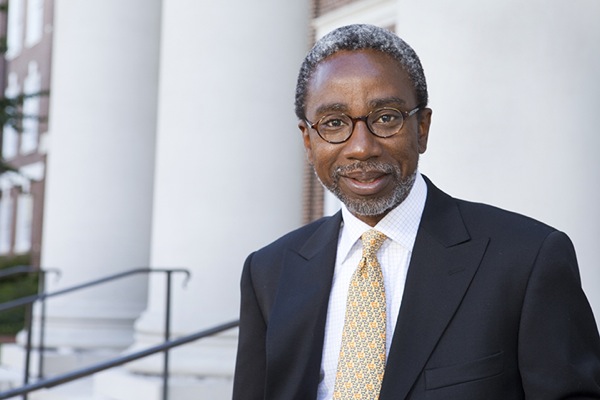
Diversity letter
Engineering deans collectively commit to diversity at White House Demo Day
2:44 p.m., Aug. 4, 2015--Just three percent of America’s venture capital-backed startups are led by women and only about one percent by African-Americans. And, with capital for innovative startups predominantly available in just a few places, high-growth business creation is a challenge outside a handful of metro hubs.
On Tuesday, Aug. 4, President Barack Obama hosted the first-ever White House Demo Day, aimed at changing those numbers to reflect better ethnic, gender and geographic diversity in entrepreneurship.
Campus Stories
From graduates, faculty
Doctoral hooding
Demo Day provided a platform for the president to welcome startup founders from diverse walks of life and to announce new public- and private-sector commitments that promise to provide more Americans with the opportunity to pursue their game-changing ideas.
More than 100 engineering deans from schools across the country, including the University of Delaware’s Babatunde A. Ogunnaike, were at the event in spirit if not in person.
In a letter shared at Demo Day, members of the group expressed their commitment to providing women and other underrepresented demographic groups with increased opportunities to pursue meaningful engineering careers.
Engineering a commitment to diversity
Submission of the “Diversity Letter” was organized under the aegis of the American Society for Engineering Education, which declared 2014-15 the Year of Action in Diversity.
“Engineering is empowering society in unprecedented ways,” the deans wrote. “It is at the core of all innovation, resulting in tremendous societal and economic benefits; it is the most important discipline to address current and emerging challenges in the U.S. and on a global scale; and it provides new, imaginative ways to enrich life.”
“A fundamental requirement for growth of this enabling power, however, is for the engineering community to attract and engage people from all segments of our society. Diversity and inclusiveness are essential for the development of creative solutions to the world’s challenges and to enrich life.”
In the letter, all of the deans committed to developing:
- A diversity plan for their engineering programs with the help and input of national organizations;
- At least one K-12 or community college pipeline activity;
- Strong partnerships between research-intensive engineering schools and non-Ph.D. granting engineering schools serving populations underrepresented in engineering; and
- Proactive strategies to increase the representation of women and underrepresented minorities in their faculty.
At UD, Ogunnaike, who was born and raised in Nigeria, is dedicated to crafting engineering programs that are relevant to 21st century challenges. Key to that commitment is establishing a culture of respect and inclusiveness.
“If we expect our graduates to make the world a better place, we have to prepare them for that challenge by providing them with not only an education in the principles of engineering but also an environment that fosters creativity, promotes entrepreneurship, invites diverse points of view, and offers appropriate role models for everyone,” he says.
“We have a lot of programs in place at UD to support students on the path to an engineering career, but we need to do more,” he adds. “By joining with other engineering schools across the nation, and having the backing of ASEE, I think we can make better progress toward a time when the engineering community fully embraces all segments of our increasingly diverse society.”
Demo Day in action
More than 30 startup teams exhibited at Demo Day, with the exhibits ranging from early-stage technologies to growth-stage consumer products.
The president also announced major new steps to promote inclusive entrepreneurship and innovation across the United States — including actions that will build the tech talent pipeline, cut red tape and accelerate research discoveries from the lab to the marketplace.
Each of these actions promises to expand opportunities for current and future entrepreneurs, including those in underrepresented communities and geographies. Key actions include:
- Announcing the winners of multiple Small Business Administration entrepreneurship competitions and launching new resources;
- Scaling up the National Science Foundation’s Innovation Corps (I-Corps) program;
- Engaging a diverse array of students in science, technology, engineering and mathematics (STEM) programs and the national laboratories;
- Fostering local entrepreneurship through the Regional Innovation Strategies program;
- Unlocking the potential of federal inventions with entrepreneurs from all backgrounds;
- Providing free legal assistance for innovators in all 50 states; and
- Encouraging partnerships between big companies and growing startups.
White House Demo Day is part of the president’s Startup America initiative to celebrate, inspire and accelerate high-growth entrepreneurship throughout the nation. Next year, the White House will report on progress made toward the inclusive entrepreneurship goals and best practices announced at the event.
About ASEE
The American Society for Engineering Education is a nonprofit association of more than 12,000 members representing colleges, corporations and other organizations dedicated to promoting excellence in engineering education and engineering technology education.
ASEE, which celebrated its centennial in 1993, plays a key role in developing and promoting policies that will enable engineering education and its allied branches of science and technology to meet the new challenges of global competition and changing demographics.
Article by Diane Kukich








